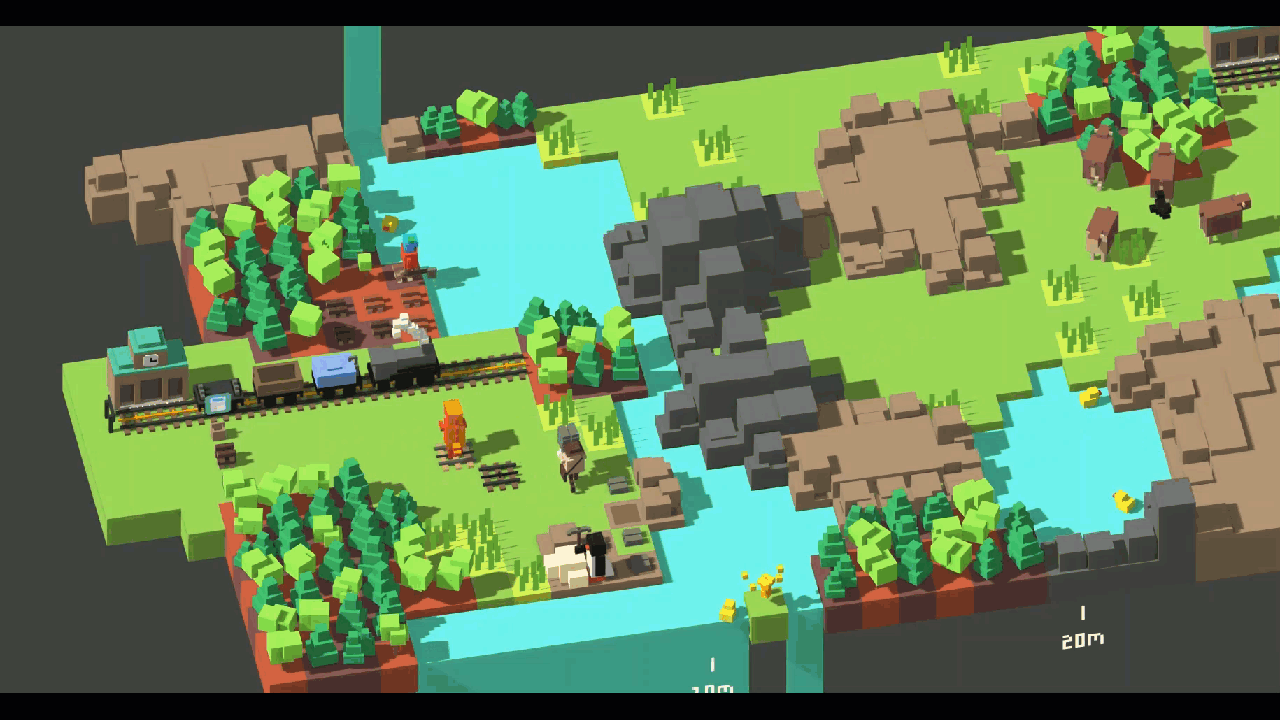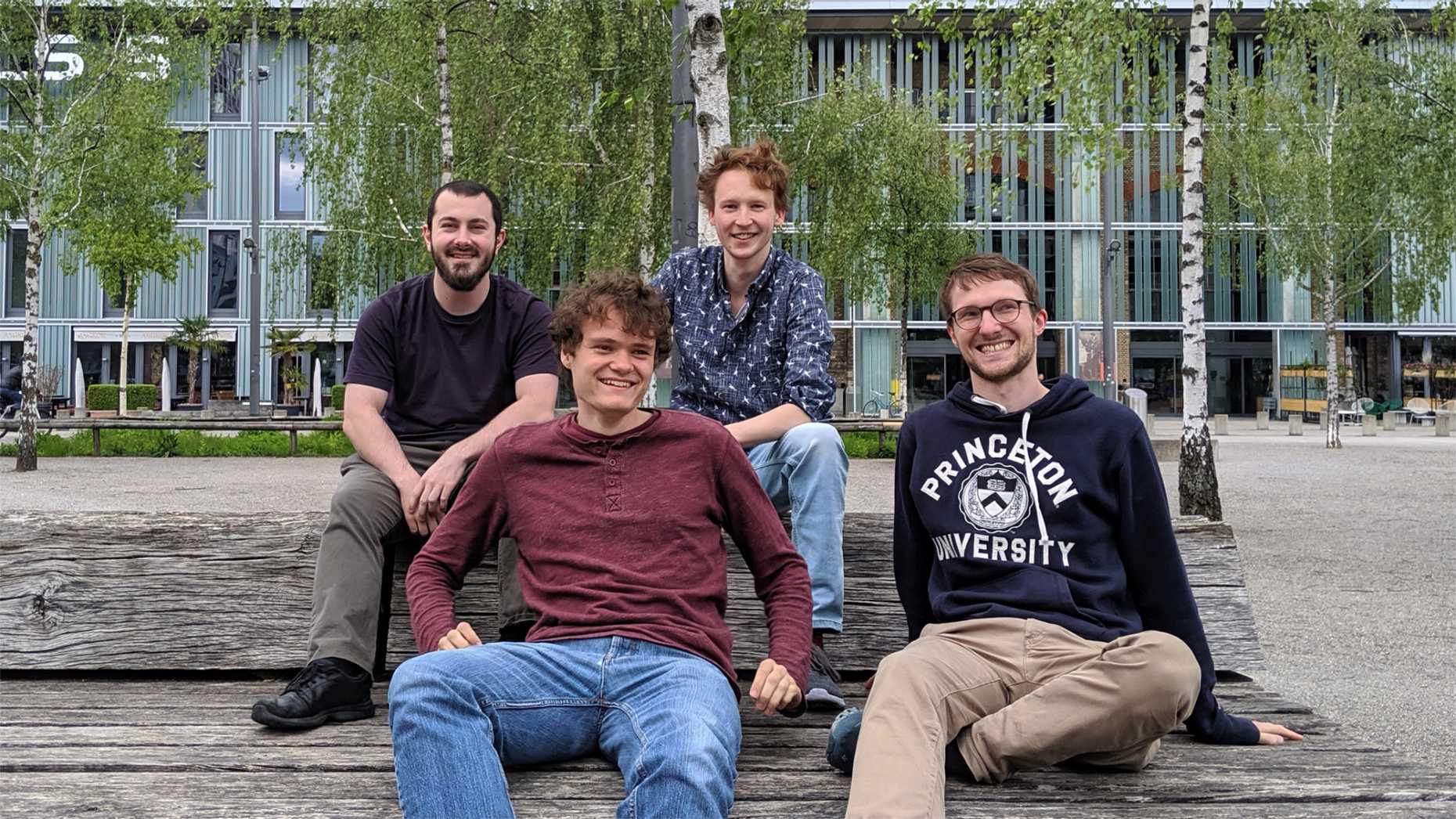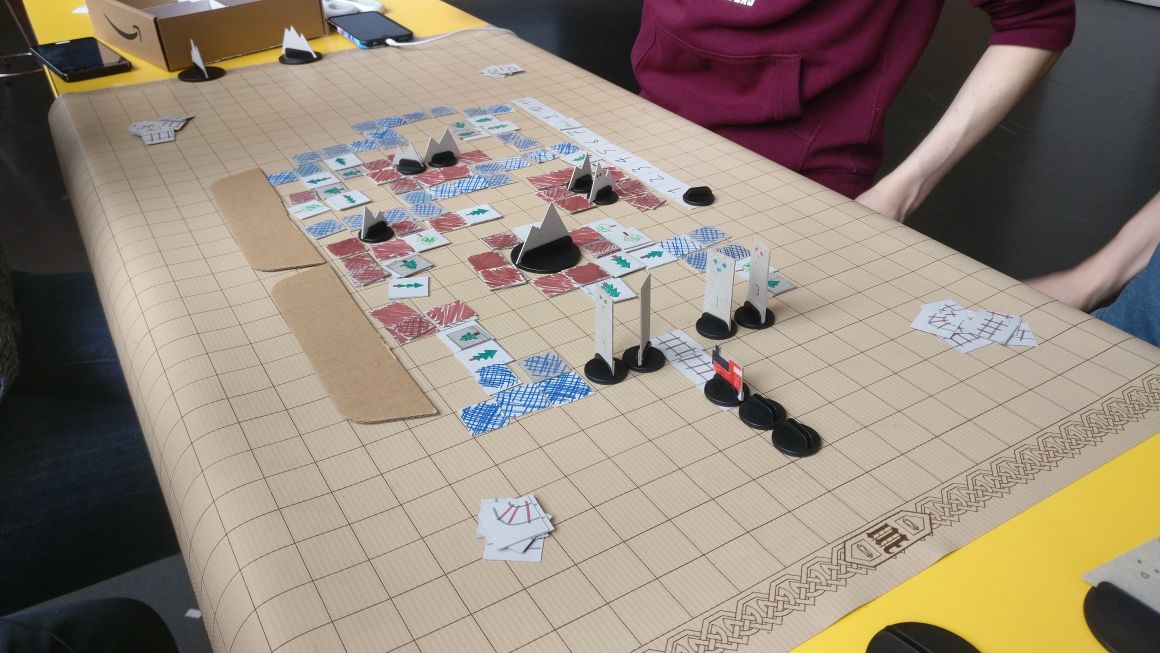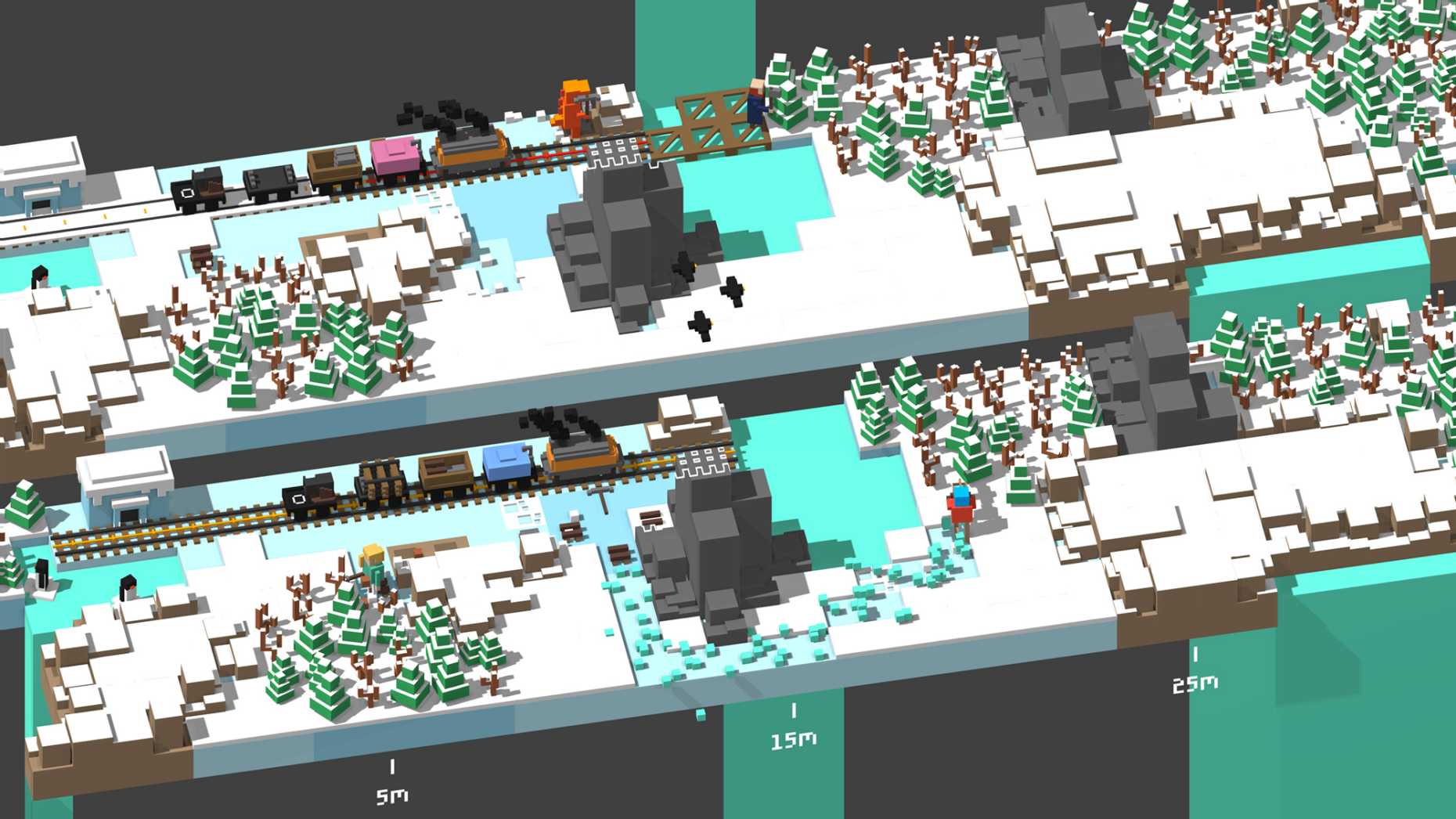Full steam ahead
Can you turn a semester project into a business idea? Yes, of course! The video game Unrailed!, developed by Hendrik Baatz, Thomas Lang, Lukas Rahmann and Thomas Wolf as part of the Game Programming Laboratory course, has garnered worldwide interest at trade shows and in the media. On 9 September 2019, it became the first game developed at the Department of Computer Science to be commercially available.

Hendrik Baatz, Thomas Lang, Lukas Rahmann and Thomas Wolf registered for the elective subject Game Programming Laboratory (GPL) in the 2018 spring semester “just for fun”. So, the Master’s students were themselves somewhat surprised when, just a few months later, they founded their spin-off Indoor Astronaut and travelled to Cologne to present their game “Unrailed!” at gamescom, the world’s largest trade fair for the video game industry. They could, however, only stay for a few days, as the expo takes place in the middle of the exam session. “It was very impressive – and exhausting!” recalls Thomas Lang.
In the GPL, Master’s students work in small groups to create a three-dimensional video game from scratch, with the requirement that it must have at least one technically challenging feature. The project has to be completed within one semester, so the students must allocate and manage their tasks efficiently. “I think this course is particularly valuable at the Department of Computer Science because it not only reinforces core computer science skills, but also incorporates soft skills and teamwork,” explains Professor Robert Sumner, who supervises the lab.
To provide a framework for the students’ creativity, the GPL team defines a course theme every year. In 2018, this theme was “Alfred Escher”, in honour of the 200th birthday of the Swiss railway magnate, who was also instrumental in the founding of ETH Zurich. Inspired by his work, Baatz, Lang, Rahmann, Wolf and the fifth team member, Valentin Scherer, decided to design a game about building railroads.

The goal of Unrailed! is simple: to make a train travel as far as possible without derailing. The fact that four players have to work together under time pressure makes for a lot of fun and, at least for beginners, a lot of chaos. The game designers describe the game mechanics as “cooperative micromanagement”: players use various tools to collect resources, build and lay tracks, remove obstacles and fill the steam locomotive with water – all in a charmingly blocky, lovingly animated environment.
From a semester project to an early access game
The playtesting sessions, which the team held on the large info screen in the CAB building towards the end of the semester, made it clear that the game was on the right track: despite initial bugs, Unrailed! met with great enthusiasm from the test players. After fine-tuning their final version, the team won both the jury and audience awards at the final public presentations of the GPL projects. Shortly afterwards, the foundation Pro Helvetia invited them to be part of their gamescom 2018 exhibit. “Pro Helvetia has helped us a lot,” says Lukas Rahmann. “With their support, we were able to get Unrailed! out into the world. For example, it was thanks to them that we went to the Game Connection convention in Paris, where we first met and talked to our eventual publisher Daedalic Entertainment.”
However, it was not originally the students’ intention to continue working on their game outside the GPL. “It took some time before we realised that a lot of people were interested in our game and in working with us,” says Thomas Wolf. And so, four of the five team members decided to found the ETH spin-off Indoor Astronaut and to take a semester or two off from their studies to focus on setting up the company and further developing the game. When they eventually signed the contract with Daedalic Entertainment, the “astronauts” made history: Unrailed! is the first game since the founding of GPL more than ten years ago to become commercially available through a publisher.

“Not only did the students do an excellent job during the semester, they were also motivated to continue working on the project even after the course had finished and their grades were set,” enthuses Professor Sumner. The engaging gameplay is another aspect that makes Unrailed! stand out. “As part of the Game Programming Laboratory, all groups have to build a physical prototype, a kind of board game. Unrailed! worked just as well in this phase as it did later in digital form – and it was a lot of fun,” Sumner explains.
Fun to play, difficult to code
Transforming the basic concept into a working video game in just three months wasn’t easy. “The time management and coordination between several people were quite challenging,” says Lukas Rahmann. The team is particularly proud of the successful procedural generation of the in-game world. This represented the technical challenge of Unrailed!, which truly put the students’ computer science skills to the test. In order for Unrailed! not to become repetitive, the in-game map must be generated anew every time the game is played, while still remaining solvable, meaning that as long as the players avoid making mistakes, the little steam train rolls on and on.
The replay feature, which the team implemented at short notice for the final presentation, was an additional challenge. It allows players to record a game session and watch it in real time or fast-forward, as well as resume playing at any point in the playback. The ambitious students invested a lot of programming time into this idea – which probably contributed to the fact that Unrailed! had the most lines of code of all the 2018 GPL games. And since then it has continued to grow. “From a technical point of view, today’s game has little to do with the version we showcased at the end of the GPL,” says Lukas Rahmann.

People who are not involved in computer science tend to underestimate video games. The Indoor Astronaut team has also experienced this on occasion. “In truth, game development is an area that encompasses many aspects of computer science,” says Thomas Wolf. “It’s one of the most exciting professions in computer science, besides research,” adds Lukas Rahmann. However, whether the four co-founders of Indoor Astronaut stay in this profession for long depends entirely on whether their debut Unrailed! can pick up steam. The game has been available since 9 September 2019 as an early access title for the PC and includes some new modes and features created by the four developers. Indoor Astronaut are also interested in creating versions for game consoles, provided the demand remains high. But first, the four students must work on their Master’s theses, once again dividing their time between their spin-off and their ETH studies.
Even though the original “just for fun” course ended up involving much more work and effort than the planned three months, the four “astronauts” still had their share of fun. “Being an exhibitor at the expos instead of a visitor was a new world for us,” recalls Thomas Lang. “It was impressive to stand next to the big players in the gaming industry.” And despite the whole business aspect, the gaming part is also not neglected at the trade fairs: “We discovered numerous indie games during our trade fair visits, which is very inspiring,” says Thomas Wolf. “And it’s a lot of fun to watch people play Unrailed!,” adds Hendrik Baatz. “Yes, there are very different ways to play our game,” laughs Lukas Rahmann. “Some teams are very cooperative, while others are on the verge of bashing each other’s heads in after just ten minutes.” Of course, the creators themselves, who still love playing their game, would never go off the rails in such a way.

Game Programming Laboratory
The Game Programming Laboratory was created in 2007 by Professor Markus Gross and Professor Robert Sumner. The intensive course, which is offered annually in the spring semester, is an elective subject in the Master’s programme at the Department of Computer Science and is conducted in collaboration with Zurich University of the Arts. During the one-semester course, students work in groups to develop a fully functional computer game, which must contain at least one technically sophisticated feature. The games are presented to the public at the end of the course, while also being sent for evaluation by industry experts from the British video game developer Studio Gobo, who award the jury prize to the best game. Particularly well-made games are presented at trade fairs and exhibitions, where they help promote computer science to the wider public. Thus Unrailed! was also a part of the ETH Pavilion at the World Economic Forum in Davos. Read more